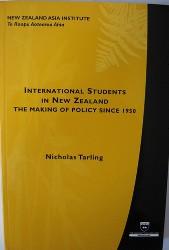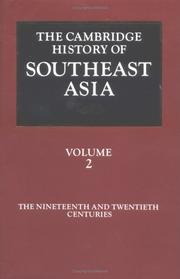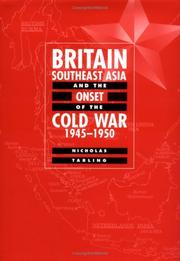| Listing 1 - 10 of 49 | << page >> |
Sort by
|
Book
ISBN: 0908689667 9780908689668 Year: 2000 Publisher: Auckland New Zealand Asia Institute
Abstract | Keywords | Export | Availability | Bookmark
 Loading...
Loading...Choose an application
- Reference Manager
- EndNote
- RefWorks (Direct export to RefWorks)
History as a science --- Southeast Asia --- Historians --- Historiography --- Historiography. --- Historians - Southeast Asia --- Southeast Asia - Historiography

ISBN: 0476005884 9780476005884 Year: 2004 Publisher: Auckland, N.Z. New Zealand Asia Institute
Abstract | Keywords | Export | Availability | Bookmark
 Loading...
Loading...Choose an application
- Reference Manager
- EndNote
- RefWorks (Direct export to RefWorks)
Objectives of teaching --- Higher education --- New Zealand --- Students, Foreign --- Government policy --- History --- History. --- Students, Foreign - Government policy - New Zealand --- Students, Foreign - New Zealand - History

ISBN: 052162245X 0521625645 Year: 1998 Publisher: Cambridge, U.K. ; New York, NY, USA : Cambridge University Press,
Abstract | Keywords | Export | Availability | Bookmark
 Loading...
Loading...Choose an application
- Reference Manager
- EndNote
- RefWorks (Direct export to RefWorks)
National state. --- Nationalism --- Nation --- Nationalisme --- History --- Histoire --- Southeast Asia --- Asie du Sud-Est --- Politics and government --- Politique et gouvernement --- Nation-state. --- History. --- Historiography.

ISBN: 0415369045 Year: 2005 Volume: 30 Publisher: London ; New York : Routledge,
Abstract | Keywords | Export | Availability | Bookmark
 Loading...
Loading...Choose an application
- Reference Manager
- EndNote
- RefWorks (Direct export to RefWorks)
Political corruption --- Corruption --- Democratization --- Corruption politique --- Démocratisation --- East Asia --- Southeast Asia --- Extrême-Orient --- Asie du Sud-Est --- Politics and government. --- Politics and government --- Politique et gouvernement --- #SBIB:35H52 --- #SBIB:35H6060 --- #SBIB:053.IO --- Ethiek van bestuur en beleid --- Bestuur en beleid: nationale en regionale studies: Azië --- Démocratisation --- Extrême-Orient --- Corrupt practices --- Ethics --- Boss rule --- Corruption (in politics) --- Graft in politics --- Malversation --- Political scandals --- Politics, Practical --- Misconduct in office --- Democratic consolidation --- Democratic transition --- Political science --- New democracies
Book
ISBN: 3319536494 3319536486 Year: 2017 Publisher: Cham : Springer International Publishing : Imprint: Palgrave Macmillan,
Abstract | Keywords | Export | Availability | Bookmark
 Loading...
Loading...Choose an application
- Reference Manager
- EndNote
- RefWorks (Direct export to RefWorks)
This book offers an analysis of the decolonisation process across three different regions around the world: Central America, Southeast Asia and the Caucasus. It explores how the nature of previous imperial systems shaped the nation states that were created in their stead. By outlining these contrasting historical trajectories, this short study argues that the stability of these nation states and their ability to cooperate with one another are dependent on the acceptance of the frontiers established by the previous imperial powers. It moves from Central America, left in the early nineteenth century without any clear borders and which has suffered much inter-state tension ever since, to Southeast Asia, whose clear colonial delineations have been accepted in the post-colonial order, and finally to the Caucasus where the arbitrary boundaries of the Soviet Republics have not easily translated into nation states. Offering a concise comparison of decolonisation in three regions, this book will be of particular interest to students of history, politics and international relations.
History. --- History, Modern. --- World history. --- Imperialism. --- World politics. --- Imperialism and Colonialism. --- World History, Global and Transnational History. --- Modern History. --- Political History. --- Decolonization. --- Colonies --- Sovereignty --- Autonomy and independence movements --- Colonization --- Postcolonialism --- Colonialism --- Global politics --- International politics --- Political history --- Political science --- World history --- Eastern question --- Geopolitics --- International organization --- International relations --- Modern history --- World history, Modern --- Empires --- Expansion (United States politics) --- Neocolonialism --- Anti-imperialist movements --- Caesarism --- Chauvinism and jingoism --- Militarism --- Universal history --- History --- Geschichte. --- Central America --- Southeast Asia --- Caucasus --- Caucasus. --- Central America. --- Southeast Asia. --- Mittelamerika --- Kaukasusländer --- Südostasien --- Amérique centrale --- Asie du Sud-Est --- Caucase --- Histoire. --- Guerre russo-persane (1804-1813) --- Guerre russo-tcherkesse (1763-1864) --- Offensive du Caucase (1942-1943) --- Asien --- Südostasiaten --- Pazifischer Raum --- Ferner Osten --- Asiatisch-Pazifischer Raum --- Kaukasien --- Kawkas --- Kavkaz --- Kaukasus --- Caucasia --- Amerika --- Asia, Southeastern --- South East Asia --- Southeastern Asia --- Mercado Común Centroamericano countries --- Caucasus Mountains --- South Caucasus --- Russia (Federation)

ISBN: 0521355052 0521355060 Year: 1994 Publisher: Cambridge Cambridge University Press
Abstract | Keywords | Export | Availability | Bookmark
 Loading...
Loading...Choose an application
- Reference Manager
- EndNote
- RefWorks (Direct export to RefWorks)
Linguistics --- History of Asia --- Southeast Asia --- S04/0410 --- S31/0400 --- China: History--General works: Asia --- Indo China and South East Asia--South East Asia general (Philippines, Malaysia, Indonesia, Burma, Papua New Guinea) --- Asia, Southeastern --- Asia, Southeast --- South East Asia --- Southeastern Asia --- History. --- Asie du Sud-Est --- History --- Histoire

ISBN: 1134312733 1280062096 0203330242 9780203330241 9780415334761 0415334764 9786610062096 6610062099 9780415446778 0415446775 9781134312733 9781280062094 9781134312689 1134312687 9781134312726 1134312725 Year: 2004 Publisher: London New York RoutledgeCurzon
Abstract | Keywords | Export | Availability | Bookmark
 Loading...
Loading...Choose an application
- Reference Manager
- EndNote
- RefWorks (Direct export to RefWorks)
Nationalism in Southeast Asia seeks a definition of nationalism through examining its role in the history of southeast Asia, a region rarely included in general books on the topic. By developing such a definition and testing it out, Tarling hopes at the same time to make a contribution to southeast Asian historiography and to limit its 'ghettoization'.Tarling considers the role of nationalism in the 'nation-building' of the post-colonial phase, and its relationship both with the democratic aspirations associated with the winning of independence and with the authoritarianism of
Nationalism --- Consciousness, National --- Identity, National --- National consciousness --- National identity --- International relations --- Patriotism --- Political science --- Autonomy and independence movements --- Internationalism --- Political messianism --- History. --- Southeast Asia

ISBN: 0511522983 0521553466 0521028639 Year: 1996 Publisher: Cambridge : Cambridge University Press,
Abstract | Keywords | Export | Availability | Bookmark
 Loading...
Loading...Choose an application
- Reference Manager
- EndNote
- RefWorks (Direct export to RefWorks)
This book describes British policy in South-East Asia in the early years of World War II. Britain, a major colonial power in Asia at this time, was unable to maintain its military dominance as war with Germany taxed its resources. Instead, Britain attempted to establish diplomatic dominance, trying to avert the Japanese military expansion and total penetration of Asia, and relying on the Americans to help. This book focuses in detail on Britain's wartime relations with Dutch India, the Philippines, French Indo-China and Thailand. It is an important reinterpretation of the origins of the Pacific War which escalated European conflict into a world war.
World War, 1939-1945 --- Southeast Asia --- Great Britain --- Asia, Southeast --- Asia, Southeastern --- South East Asia --- Southeastern Asia --- Foreign relations --- History. --- History --- Arts and Humanities

ISBN: 0521632617 0521033365 0511552343 9780521632614 Year: 1998 Publisher: Cambridge : Cambridge University Press,
Abstract | Keywords | Export | Availability | Bookmark
 Loading...
Loading...Choose an application
- Reference Manager
- EndNote
- RefWorks (Direct export to RefWorks)
This detailed study throws light on the evolution of British policy in South-east Asia in the turbulent post-war period. Through extensive archival research and insightful analysis of the British mindset and official policy, Tarling demonstrates that South-east Asia was perceived as a region consisting of mutually co-operating new states, rather than a fragmented mass. The book covers the immediate post-war period until the Colombo plan and the outbreak of hostilities in Korea. A companion volume to Tarling's Britain, Southeast Asia and the Onset of the Pacific War, it finds parallels between Britain's approach to the threat of Japan and its approach to the threat of communism. It also shows that the British sought to shape US involvement, in part by involving other Commonwealth countries, especially India. This is a major contribution to the diplomatic and political history of South-east Asia.
Cold War --- World politics --- Southeast Asia --- Great Britain --- Foreign relations --- History --- Arts and Humanities --- World politics - 1945-1955 --- Southeast Asia - Foreign relations - Great Britain --- Great Britain - Foreign relations - Southeast Asia --- Great Britain - History - George VI, 1936-1952 --- Cold War. --- Asia, Southeast --- Asia, Southeastern --- South East Asia --- Southeastern Asia
Book
ISBN: 9814311014 9814311499 9814515477 Year: 2011 Publisher: Singapore : Institute of Southeast Asian Studies,
Abstract | Keywords | Export | Availability | Bookmark
 Loading...
Loading...Choose an application
- Reference Manager
- EndNote
- RefWorks (Direct export to RefWorks)
With the disappearance of the imperial structures that had dominated Southeast Asia, newly independent states had to develop foreign policies of their own. But so far few if any of these states have been willing to allow the public to explore any documentation of their activities. Building on his earlier work that drew on U.K. records, the author incorporates material from New Zealand archives - which also contain reports from Australian and Canadian diplomats - to provide an historical analysis of the foreign policies of Southeast Asian nations from a New Zealand perspective.
Regionalism --- Southeast Asia --- New Zealand --- Foreign relations --- History
| Listing 1 - 10 of 49 | << page >> |
Sort by
|

 Search
Search Feedback
Feedback About UniCat
About UniCat  Help
Help News
News